Small, but perfectly formed
12th July 2024
Having grown 100 vines in their Norfolk garden, where they began their winemaking journey, Michael and Irene Rhodes moved to Suffolk in order to found Hawkswood – possibly the UK’s smallest commercial vineyard and winery – in 2019.
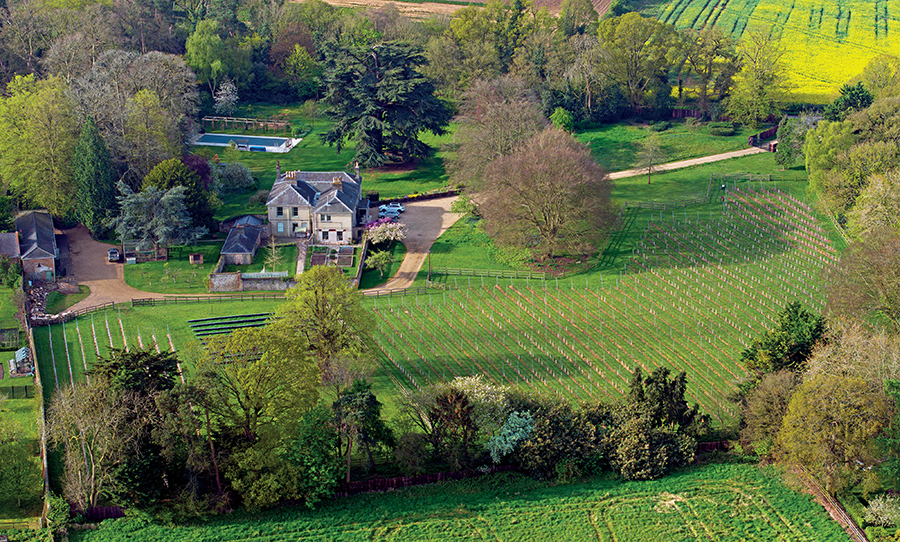
When the opportunity came for Michael Rhodes, a consultant general surgeon, to retire in 2018, it was the chance to turn a hobby into something much more.
It all started way back in 1977 when Michael discovered the German ‘Weinfests’ whilst working in Ingelheim am Rhein, which inspired a lifelong interest in wine. Then, around 15 years ago, while living in Attleborough, Norfolk, Michael and his wife Irene, who still works as a theatre nurse a couple of days a week in the nearby private hospital, made the decision to leap into the world of winemaking. “One day, I just turned to Irene and said: ‘I wonder if we could make our own wine?’” explains Michael.
“I suspect it was a bit of a mid-life crisis precipitated by the increasingly unpleasant atmosphere in the NHS; but whatever the case, we visited a vineyard a few miles from where we lived in Norfolk and were invited to help with the harvest.
“At the end of a long day, as the grapes were loaded onto a truck for transport to the winery, the owner of the vineyard – the late Mike McCauly – beckoned me over and said: ‘Take these grapes if you want to make wine’, indicating a dustbin with 50kg of Rondo grapes inside.
“To cut a long story short, I proceeded to make something utterly undrinkable!”
But, undeterred, the couple planted 100 vines in their Attleborough garden, and decided to continue on their winemaking journey.
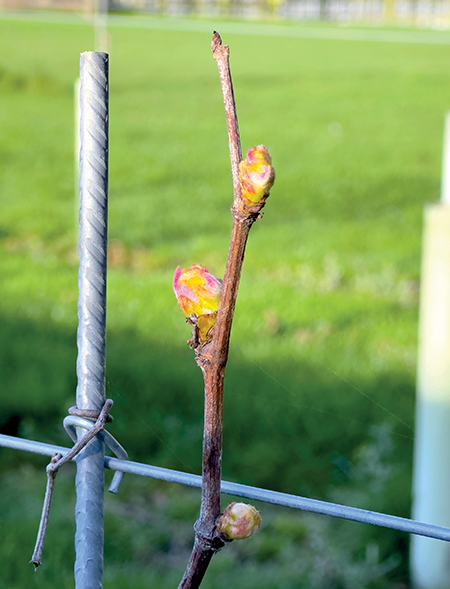
Michael explains: “As a result of my complete failure, Irene and I set about researching winemaking with some zeal, including attending a couple of day courses at Plumpton; but mainly visiting wineries all over the world and picking the brains of dozens of winemakers.
“Gradually the wines improved until we ended up making wine for a small vineyard near us – and accidentally won a WineGB East silver medal for it.
“Several more medals for other small vineyards followed as a result of our gradually improving winemaking endeavours; but we still made new mistakes every year, albeit gradually fewer.”
Irene adds: “We had such a tiny little space for the winery. Our wine tanks were all outside, and at first we literally crushed all the grapes by hand and put them into the press. We had 100- and 200-litre Spiedel stainless steel tanks and a hand wound crusher destemmer from Italy feeding into a 180-litre press.
“As the tonnage of grapes arriving grew, we had to invest in larger tanks and an electrically-driven crusher destemmer.
“But we found the situation was becoming unmanageable. Delivery lorries couldn’t get into the drive, and we just needed more space.”
Mission to find more space
So, the couple began looking for somewhere to retire with enough land suitable for a small vineyard. After two years of searching, they settled upon Thurston Place, near Bury St Edmunds, which sits on 3ha of sandy soil with a couple of acres of gently sloping south facing slopes. The old stable block on the property was ideal for conversion into a small winery with tasting room, and they invested in a second-hand half tonne pneumatic press and standardised 675-litre Spiedel tanks, with several 300-litre tanks for smaller batches.
Ask the experts
Having moved to Thurston Place in 2018, Michael and Irene reached out to James Dodson of VineWorks for advice. As a result, the main vineyard was planted in May 2019, with 1,000 Pinot Noir Précoce (Fruhburgunder), 1,000 Bacchus and 125 Rondo vines on SO4 rootstock being mechanically planted by VineWorks, using single Guyot trellising.
More vines followed later, as Michael explains: “As a result of winning some winemaking medals on behalf of a small vineyard in St Albans, who grew Solaris, James hand-planted 300 Solaris vines in 2021. And due to the popularity of our own Rondo rosé, which also won some awards, we planted a further 100 Rondo vines in 2023, which James just about managed to squeeze in!”
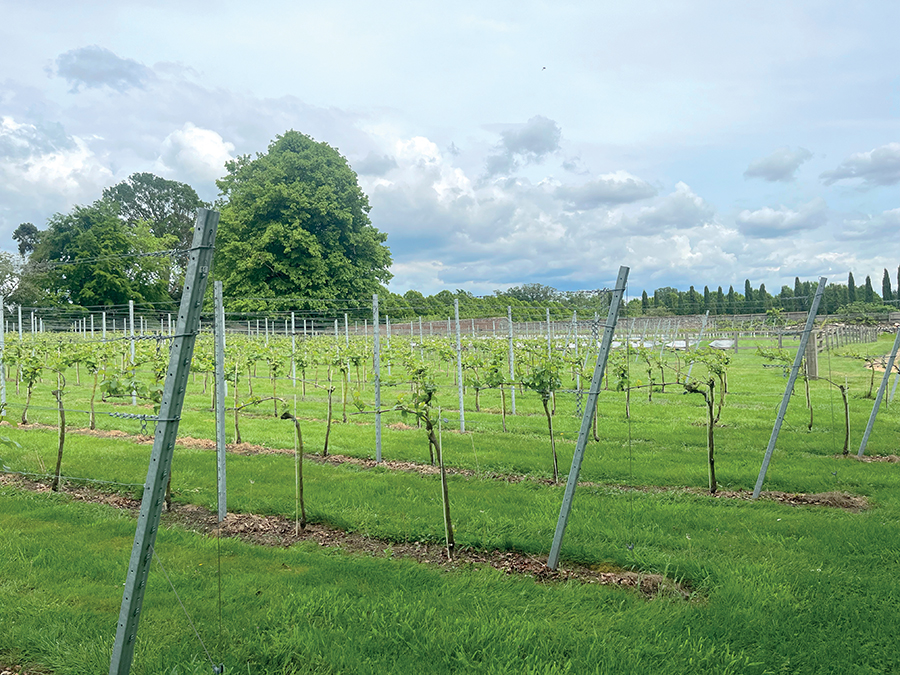
While the vineyard is still relatively young, the couple picked five tonnes in 2023, which Michael comments was “probably too much and we will be more rigorous in dropping bunches this year”.
He adds: “Yield was massively up in 2023 compared to 2022, with very little if any disease, thanks to our agronomist Penny Meadmore who helps us with a spray regime.”
Pest management
The first thing Michael and Irene did when they planned the vineyard was to rabbit and deer fence the property. Then Irene took up falconry, and has her own hawk Ruby who flies each day round the vineyard. This got rid of two rookeries at the north end of the vineyard and reduced the pigeon population by 80%. “Archie, our Cairn terrier deals with rabbits and hares when they breach the defences, whilst Nellie our golden retriever runs around watching Archie kill whatever he catches (including the odd pheasant or partridge),” adds Michael.
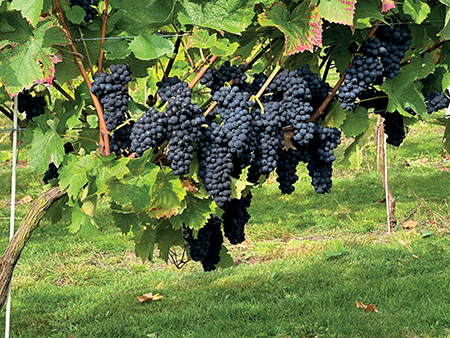
Wasps have been a big issue, but they hire a pest controller to eradicate nests as soon as they find them and use wasp traps at the end of each row.
As with most vineyards, botrytis, powdery mildew and downy mildew can be a problem; but, explains Michael, since they have engaged Penny as their agronomist, this disease burden has been greatly reduced. While the vineyard does suffer from late frosts, so far it’s not caused enough of a issue for Michael and Irene to invest in any frost control measures. “This year, the one-year-old Rondo did get frosted in the vine-guard tubes, but so far the rest of the vineyard seems fine. For now, we’ll just go with what nature throws at us!” says Michael.
Michael carries out the spray programme recommented by Penny using a John Deere Gator, and the grass is kept under control with a John Deere mower – both pieces of kit are maintained by local dealer, Tomlinson Groundcare. He also recently purchased a second-hand John Deere vineyard tractor from Tomlinson, and hopes to fit a sprayer to it before the summer is out.
Labour of love
Grapes are hand harvested by Irene and Michael, with help from Irene’s twin sister Helen, who puts in several shifts as well as friends from church and visiting family.
Wines are made just 100 yards from the vines – from vine to press takes less than an hour, and Irene hand-bottles the wines, with the two of them hand-applying the labels.
Currently, the wines produced are all still, and include Bacchus, Solaris, Rondo rosé, Pinot rosé, Pinot Noir, and a Rondo red. The couple have no plans to branch into sparkling wine production due to the varieties being grown and winery limitations.
Despite the increased winery capacity, Michael and Irene no longer make wine for other vineyards, as they are kept busy enough with their own grapes.
In 2022, the couple completed their new tasting room in order to welcome guests for vineyard and winery tours and wine tasting. As Michael explains: “We keep production to between 1,500 and 3,000 bottles of white, red and rosé wine each year, –quite simply because we do everything ourselves! We concentrate on quality rather than quantity, as confirmed by various Bacchus wines made in our winery winning medals every year for the last six years, as well as winning the prize for the best rosé in East Anglia in 2019.”
The tasting room above the winery can accommodate groups of up to 20, and Michael says it is great fun to welcome small groups for tastings. “We offer tours and tastings by appointment and can welcome folk Monday through to Saturday, from 9am to 5pm, which is what our premises license allows (and boy, was it a struggle getting that!)
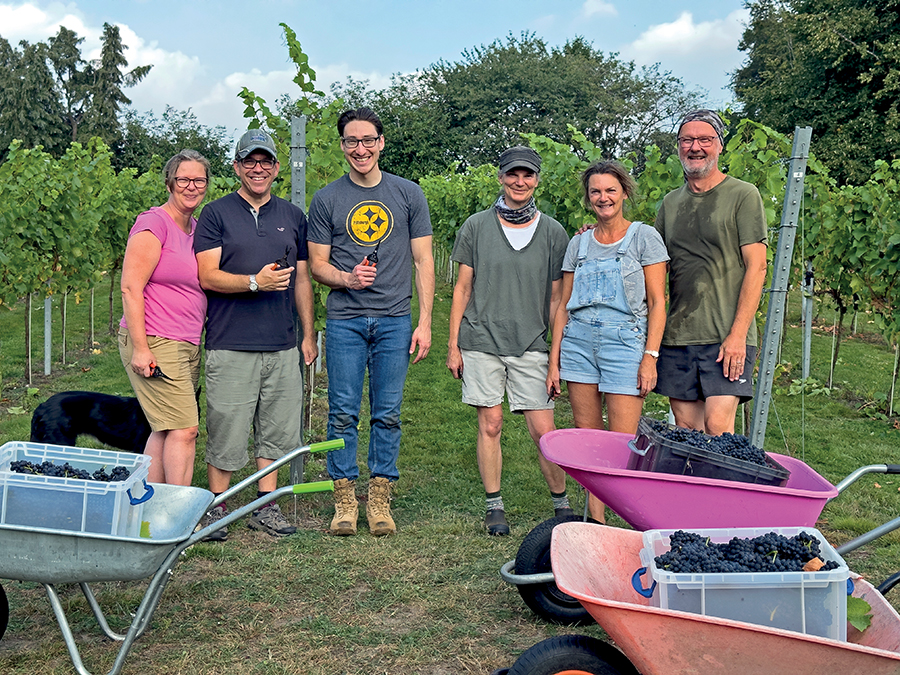
“We sell most of our wines this way, although a few local restaurants do take our wines. The difficulty is that if we sell a wine at £15 per bottle to trade, it ends up costing £49.90 on local wine lists, so sales are fairly slow on that front.”
Looking to the future
When asked what their future plans are, Michael comments: “Simply to try and make the best wine we can – maybe even improve on our WineGB National silver medals.
“We cannot really manage any more vines with just the two of us, so expansion is not on the cards – besides, ultimately we are both really pensioners. So we’ll enjoy our retirement while making and drinking wine.”
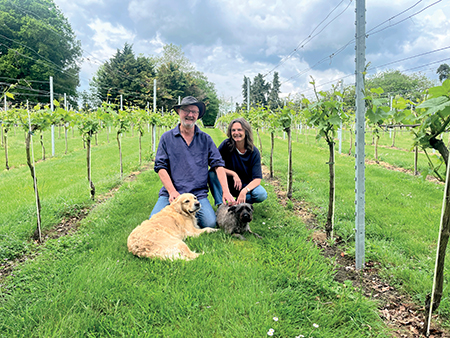
Grower Profile
Hawkswood Vineyard & Winery
- Location: Thurston, near Bury St Edmunds, Suffolk
- Total vineyard size: Just under 0.6ha
- Soil type: Sandy loam with very good drainage
- Aspect: 38m above sea level, south facing gentle slope
- Varieties grown: 1,000 Pinot Noir Précoce (Fruhburgunder), 1,000 Bacchus, 300 Solaris, and 225 Rondo vines on SO4 rootstock
Read more vine news
Read more grower profiles
